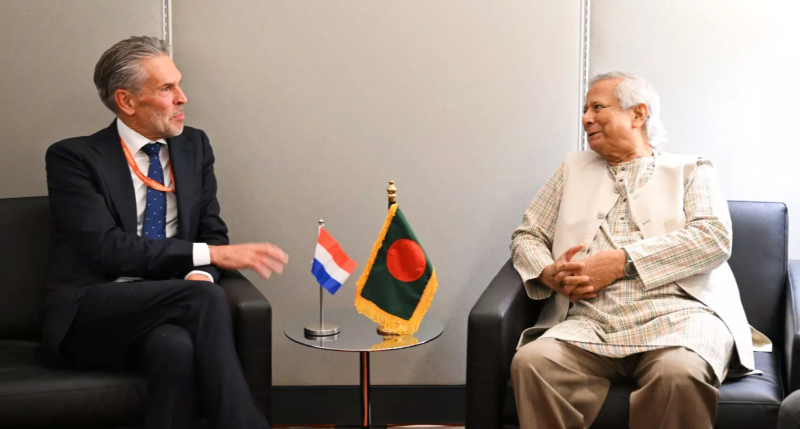- Israeli Strikes Intensify Gaza City Crisis, Casualties Rise |
- Bangladesh Bank urges insurers to fight illicit money flows |
- Prof Yunus introduces political leaders with top US companies |
- Dhaka, Rome eye expanded ties, safe migration issue discussed |
- Climate Summit 2025: The path to COP30 |
Prof Yunus Seeks Dutch Help on Water, Ocean Research

Chief Adviser Professor Muhammad Yunus on Thursday sought Dutch cooperation in water management, ocean research and in its efforts to keep Bangladesh's rivers navigable.
He emphasised the Netherlands' leadership in flood and river management and maritime technology.
Prof Yunus also sought Dutch support for establishing cold storage facilities in Bangladeshi villages to help preserve perishable agricultural products during harvest seasons.
Prof Yunus made the formal request during a meeting with Dutch Prime Minister Dick Schoof on the sidelines of the United Nations General Assembly at the UN headquarters in New York.
Foreign Affairs Adviser Md Touhid Hossain, Chief Adviser’s Special Envoy on International Affairs Lutfey Siddiqi, SDGs Affairs Principal Coordinator Lamiya Morshed, and Foreign Secretary Asad Alam Siam were present.
Highlighting Bangladesh’s emergence as a major producer of fruits and vegetables, Prof Yunus said that millions of small farmers often suffer losses due to steep price drops during harvest time, when local markets are flooded with fresh produce.
The absence of short-term cold storage facilities in rural areas leaves farmers unable to preserve their harvests, said Chief Adviser’s Deputy Press Secretary Abul Kalam Azad Majumder.
“The Netherlands is a world leader in agriculture. We need Dutch technology to preserve our produce,” said Prof Yunus. “You could also consider sending researchers and scientists to work directly with our farmers.”
He noted that hundreds of thousands of tonnes of fruits and vegetables rot each year in Bangladesh, primarily because of the lack of storage facilities. “This causes significant financial losses to our farmers,” he added.
Prof Yunus said there is a growing international interest in Bangladeshi fruits such as mangoes, jackfruits and guavas. However, scaling up exports will require access to advanced preservation technologies and logistics.
In response, Prime Minister Schoof said he would look into the issues raised and expressed interest in exploring collaboration in the textile sector as well.
The two leaders also discussed Bangladesh’s upcoming general election, reforms initiated by the Interim Government, the rising threat of misinformation and regional economic integration.
Prof Yunus sought international support to counter misinformation campaigns ahead of the general election scheduled for February.
“We need your support. We need international support to fight this menace of misinformation,” he said.
“There were no real elections during the 15 years of autocratic rule — only fake votes. Now, the cronies of the former dictators are funding anti-Bangladesh misinformation campaigns aimed at derailing the upcoming election,” he added.
The Chief Adviser reiterated his government's commitment to holding a free, fair, and peaceful election in the first half of February.
He mentioned that six political leaders are accompanying him in New York to help establish global connections ahead of the country's democratic transition, reports UNB.
“Millions of young Bangladeshis are excited to vote. Many of them have never had the opportunity to cast their ballots,” he said.
Prime Minister Schoof echoed concerns about the growing misuse of artificial intelligence and its potential to spread misinformation, warning that it poses a serious threat to democracies worldwide. "We can work together,” he said.

